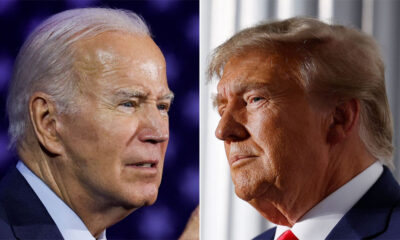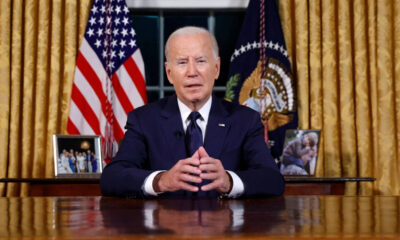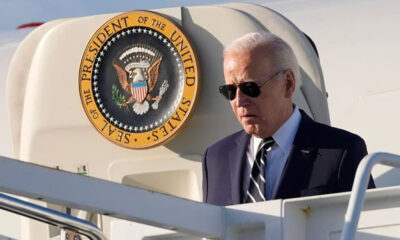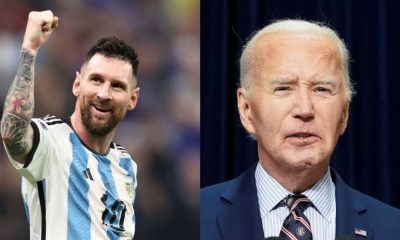International
Biden, Xi restore military ties despite ‘dictator’ comment
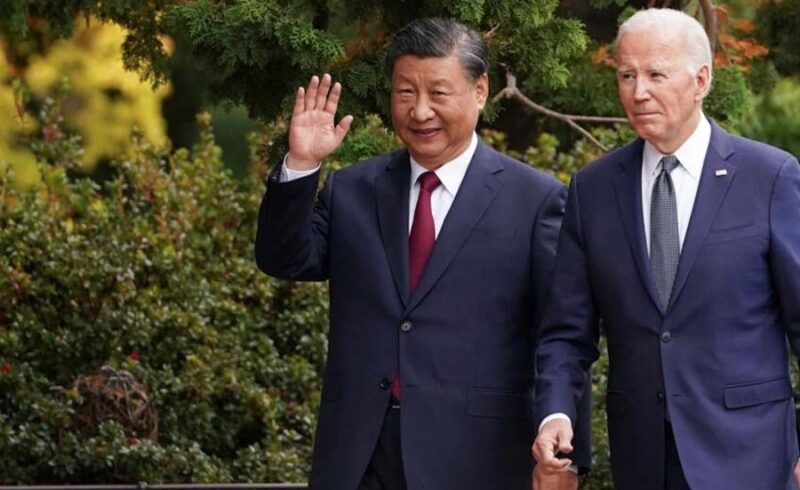
Biden, Xi restore military ties despite ‘dictator’ comment
US President Joe Biden and Chinese President Xi Jinping agreed at their first summit in a year on Wednesday to restore military communications between the two countries, even as Biden went off script by saying he still considered Xi a “dictator.”
The leaders shook hands and strolled around a garden at a historic California estate during four-hour talks aimed at preventing growing tensions between the world’s largest economies from spiraling into conflict.
They also agreed that China would crack down on the production of ingredients for fentanyl, responsible for a deadly epidemic of opioid abuse in the United States, with Xi saying he “sympathizes” with US victims of the deadly drug, which has ravaged communities across the country.
But Xi and Biden remained far apart on the wider flashpoint of Taiwan, with the Chinese president telling his US counterpart to stop arming the island and that reunification was “unstoppable.”
Beijing claims sovereignty over the self-ruling democracy and has not ruled out seizing it by force.
The two leaders had not met in person since they held talks in Bali in November 2022, and relations nosedived after the United States shot down an alleged Chinese spy balloon in February this year.
But Biden told a press conference at the Filoli estate that his talks with Xi, whom he has known since 2011, were “some of the most constructive and productive discussions we’ve had.”
‘He’s a dictator’
The United States would compete “vigorously” but “responsibly” with an increasingly assertive China “so it doesn’t veer into conflict or accidental conflict,” Biden said.
“He and I agreed that each one of us could pick up the phone, call directly and we’ll be heard immediately.”
READ ALSO:
-
Collapsed building claims life of 80-year-old woman in Lagos
-
BREAKING: Adeleke appoints Justice Afolabi Osun acting Chief judge
-
Defamation: Court finally grants Tani Olohun bail
The separate move to restore high-level US-China military-to-military communications, which China severed after then-US House speaker Nancy Pelosi visited Taiwan in 2022, was “critically important” to avoid possible conflicts, Biden added.
The two sides also agreed to hold talks on artificial intelligence and to deepen cooperation on climate change ahead of the COP28 conference in Dubai next month.
International
Democrats drag Trump to court over election overhaul order

Democrats drag Trump to court over election overhaul order
The Democratic Party has sued the Trump administration over an attempt to impose sweeping changes on the election systems, including requiring citizenship proof to register to vote and limiting mail-in ballot counting.
In a lawsuit filed Monday, the Democratic Party asked a federal court to block the executive order, which prevents states from counting mail-in ballots that arrive after election day. The president’s directive also requires proof of citizenship to be presented — through documents such as a passport — when registering to vote.
“The President does not get to dictate the rules of our elections,” said the lawsuit filed in Washington by the Democratic National Committee, Senate Minority Leader Chuck Schumer, House Minority Leader Hakeem Jeffries and others.
“The Executive Order seeks to impose radical changes on how Americans register to vote, cast a ballot, and participate in our democracy—all of which threaten to disenfranchise lawful voters and none of which is legal,” it added.
After signing the March 25 order, called “Preserving and Protecting the Integrity of American Elections”, US President Donald Trump described it as “the farthest-reaching executive action taken” to secure US elections.
READ ALSO:
- If anything happens to me, hold Akpabio, others responsible – Natasha
- Breaking: ‘Cancel your homecoming’ — Police tell Senator Natasha
- Lightning strike kills herder, 12 cows in Kaduna
Trump, who does not acknowledge his defeat in the 2020 presidential election, has long questioned the integrity of the US electoral system. He has repeatedly and baselessly amplified conspiracy theories about massive election fraud in the United States, particularly involving absentee voting.
Legal scholars swiftly denounced Trump’s election order as an abuse of presidential power that could prevent millions of eligible voters from casting ballots.
Advocacy groups led by the Campaign Legal Center and State Democracy Defenders Fund filed a separate lawsuit on Monday against the same executive order.
“The president’s executive order is an unlawful action that threatens to uproot our tried-and-tested election systems and silence potentially millions of Americans,” Danielle Lang of the Campaign Legal Center said in a statement.
“It is simply not within the president’s authority to set election rules by executive decree, especially when they would restrict access to voting in this way.”
Democrats drag Trump to court over election overhaul order
AFP
International
Iran warns US against attack, threatens with nuclear weapon

Iran warns US against attack, threatens with nuclear weapon
Iran would have no alternative but to acquire a nuclear weapon if attacked by the United States or its allies, an adviser to the country’s supreme leader warned on Monday, following a threat by Donald Trump.
The comments came hours after the supreme leader himself, Ayatollah Ali Khamenei, had promised to hit back if the US president made good on his threat to bomb the Islamic republic if it did not agree to a deal to curb its nuclear programme.
“We are not moving towards (nuclear) weapons, but if you do something wrong in the Iranian nuclear issue, you will force Iran to move towards that because it has to defend itself,” Khamenei’s adviser Ali Larijani said in an interview with state TV.
“Iran does not want to do this, but… (it) will have no choice,” he added.
“If at some point you (the US) move towards bombing by yourself or through Israel, you will force Iran to make a different decision.”
In an interview on Saturday, Trump had said “there will be bombing” if Iran did not agree to a new nuclear deal, according to NBC News, which said he also threatened to punish Tehran with what he called “secondary tariffs”.
Trump’s language represented a sharpening of his rhetoric, though it was not clear whether he was threatening bombing by US planes alone or perhaps in an operation coordinated with another country, possibly Iran’s nemesis Israel.
“They threaten to do mischief,” Khamenei said of the remarks during a speech on Eid al-Fitr, the holiday marking the end of the Muslim fasting month of Ramadan.
READ ALSO:
- Lagos Govt says speed limit rules have come to stay
- Aide to Israel’s Netanyahu arrested in PM corruption probe
- Kano Gov Yusuf, Sanusi linked to Eid killings
“If it is carried out, they will definitely receive a strong counterattack.”
Iranian foreign ministry spokesman Esmaeil Baqaei, in a post on X, said the threat was “a shocking affront to the very essence of international peace and security”.
Baqaei warned of unspecified “consequences” should the United States choose a path of “violence”.
Western countries including the United States have long accused Iran of pursuing a nuclear weapon, which Tehran has denied, insisting its enrichment activities were solely for peaceful purposes.
The 2015 nuclear deal between Tehran and world powers required Iran to limit its nuclear ambitions in exchange for sanctions relief.
– ‘Indirect’ channel –
On March 7, Trump said he had written to Khamenei to call for nuclear negotiations and warn of possible military action if Tehran refused.
READ ALSO:
- Amosun, Adeola engage in verbal attack over project diversion allegation
- 2027 election: Shehu Sani declares bid for Kaduna central senatorial seat
- How they murdered my Kano-bound passengers in Edo
The letter was delivered to Tehran on March 12 by UAE presidential adviser Anwar Gargash, Iranian news agency Fars reported at the time.
On Thursday, Iranian Foreign Minister Abbas Araghchi said the country had delivered a response via intermediary Oman, without detailing its content.
Araghchi said Iran would not engage in direct talks “under maximum pressure and the threat of military action”.
In his remarks, however, the minister left open the door for “indirect negotiations”.
According to NBC, Trump also said US and Iranian officials were “talking,” but he did not give details.
President Masoud Pezeshkian on Sunday said Khamenei, who as supreme leader has the final say in major state policies, had permitted indirect talks.
Oman has served as an intermediary in the past, in the absence of US-Iranian diplomatic relations severed after the 1979 Islamic revolution.
On Monday, Araghchi said the United States had received Iran’s letter.
“We have been informed by our friends in Oman that the letter has reached its destination and has been read.”
Beyond its nuclear programme, the West also accuses Iran of using proxy forces to expand its influence in the region, a charge Tehran rejects.
“There is only one proxy force in this region, and that is the corrupt usurper Zionist regime,” Khamenei said, calling for Israel to be “eradicated”.
Iran warns US against attack, threatens with nuclear weapon
International
‘Bitcoin could replace U.S. Dollar as global currency’

‘Bitcoin could replace U.S. Dollar as global currency’
BlackRock Chairman and CEO Larry Fink acknowledged in his 2025 annual letter that Bitcoin could challenge the U.S. dollar’s status as the global reserve currency.
“If the U.S. doesn’t get its debt under control, if deficits keep ballooning, America risks losing that position to digital assets like Bitcoin,” Fink wrote in BlackRock’s March 2025 letter.
The statement marks a significant shift from the head of the world’s largest asset manager, recognizing digital assets as potential alternatives to the dollar.
Throughout the letter, Fink mentioned Bitcoin seven times and the dollar eight times, signaling the growing relevance of digital currencies in financial discourse.
READ ALSO:
- Aide to Israel’s Netanyahu arrested in PM corruption probe
- Kano Gov Yusuf, Sanusi linked to Eid killings
- ‘I was offered N5bn bribe to impeach Fubara’
BlackRock’s letter frames Bitcoin as both an innovation and a risk, warning that if investors view it as a more stable long-term store of value than the dollar, it could undermine U.S. financial primacy.
Fink stressed that “two things can be true at the same time,” referring to both innovation and risk in digital asset development.
Beyond Bitcoin, Fink positioned tokenization as a transformative force for capital markets, likening it to the shift from postal mail to email.
He argued that tokenized assets could bypass financial intermediaries and democratize access to investments through fractional ownership and improved voting systems.
BlackRock also highlighted India’s digital identity system as a model for secure transactions, with over 90% of Indians verifying smartphone transactions—a benchmark for future tokenized economies.
‘Bitcoin could replace U.S. Dollar as global currency’
-

 metro18 hours ago
metro18 hours agoBREAKING: Senator Natasha defies restrictions, arrives homecoming rally by helicopter [VIDEO]
-

 metro2 days ago
metro2 days agoHow they murdered my Kano-bound passengers in Edo
-
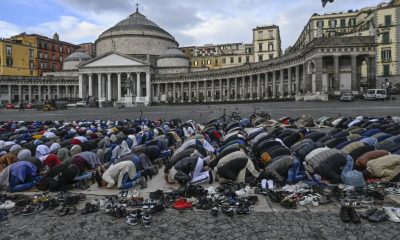
 International2 days ago
International2 days agoIn pictures: Eid celebrations around the world
-

 metro1 day ago
metro1 day agoUromi: Edo residents flee towns over likely reprisal attack, arrest
-

 metro1 day ago
metro1 day agoBreaking: ‘Cancel your homecoming’ — Police tell Senator Natasha
-
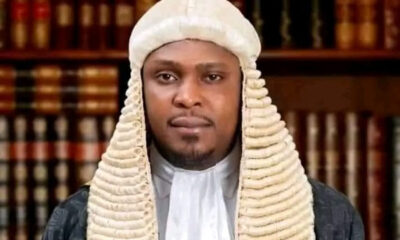
 metro2 days ago
metro2 days ago‘I was offered N5bn bribe to impeach Fubara’
-

 metro2 days ago
metro2 days agoKano Gov Yusuf, Sanusi linked to Eid killings
-

 Sports2 days ago
Sports2 days agoNigerian boxer collapses, dies in ring during fight in Ghana

